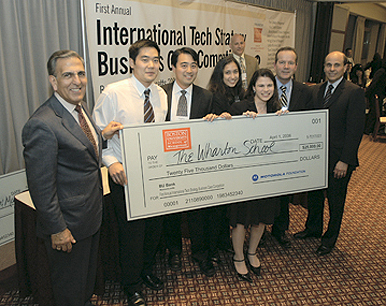Business case contest tests the best
Wharton takes gold, Kellogg and Sloan follow

They came here to win, and they dressed for victory: crisp dark suits, polished shoes, and perfect hair. Their challenge: devise a strategy of “seamless mobility” for Motorola products that would allow the company’s customers to access information anywhere, anytime, and from any number of devices. Their deadline: 24 hours. And their reward: cash prizes totaling $45,000.
Representing many of the best business schools on the planet, 12 four-person teams came to the Boston University School of Management, each determined to take home top honors in the first-ever International Tech Strategy Business Case Competition, held on March 31 and April 1.
“It was an interesting challenge,” said Sridhar Parameshwaran, from the Kellogg Graduate School of Management at Northwestern University. “We had to determine what that could mean for [Motorola] in 24 hours.”
Parameshwaran’s group coined the phrase “MotoHome,” used to describe a home system that would be the “brain” of the house, synchronizing laptop, television, stereo, cell phone, and other devices, all connected to a central hub and controlled by a remote so that information from every device could be at a user’s fingertips at all times.
Teams from other schools, including the Wharton School (University of Pennsylvania), the Sloan School of Management (Massachusetts Institute of Technology), the Eller College of Management (University of Arizona), the Haas School of Business (University of California, Berkeley), the Indian Institute of Management, the London Business School, Queens University (Canada), Seoul National University, Stanford Graduate School of Business, McCombs School of Business (University of Texas at Austin), and BU’s School of Management, which hosted the event, presented a wide range of ideas, from the practical to the wildly innovative.
The Wharton team envisioned synchronizing devices not just at home, but everywhere, and in real time. In its plan, Motorola would enable customers to leave their office and have their documents automatically transferred to a home computer. When they left their house, the music on their computer would automatically move to their iPod, to their car, and to their Blackberry.
At the end of day one, the teams headed off for an early dinner and a late night — a very late night.
“Most of the teams got no sleep whatsoever,” said John Chalykoff, SMG associate dean. “It’s just hard work and they approached it with high, focused energy.”
By the end of the second day, the competition had been narrowed to four teams: Wharton, Kellogg, Haas, and Sloan. The final contest, judged by a panel of technology company leaders that included Motorola CEO Ed Zander (SMG’75), consisted of a 40-minute presentation on exactly how Motorola could reach the coveted state of seamless mobility. When it was over, Wharton was $25,000 richer, Kellogg had won $15,000, and Sloan had taken $5,000.
“We had a lot of confidence in our business plan and a lot of enthusiasm that percolated out,” said Jin Jung, of the winning team. Serena Kohli, also from Wharton, added that the three hours of sleep she had managed to get Friday night was likely to be a regular part of an executive’s life.
A short while later, dinner remarks by Zander echoed Kohli’s opinion. “I’m working on a strategic deal right now that came up 48 hours ago,” he said. “This competition really does represent real life.”
Success, Zander told the teams, “takes a little bit of luck, positioning yourself, pushing the envelope, and getting out of your comfort zone.”
“Finally,” he said, “there’s no substitute for working hard.”